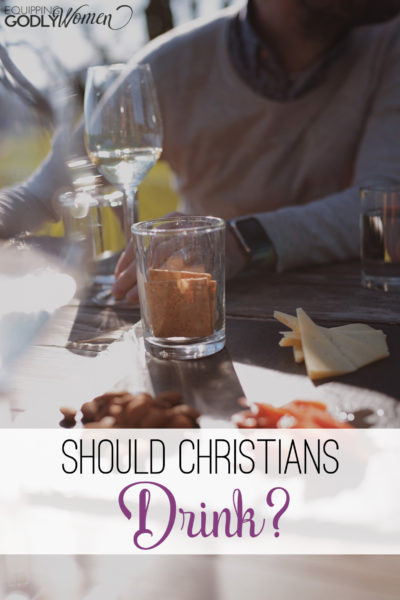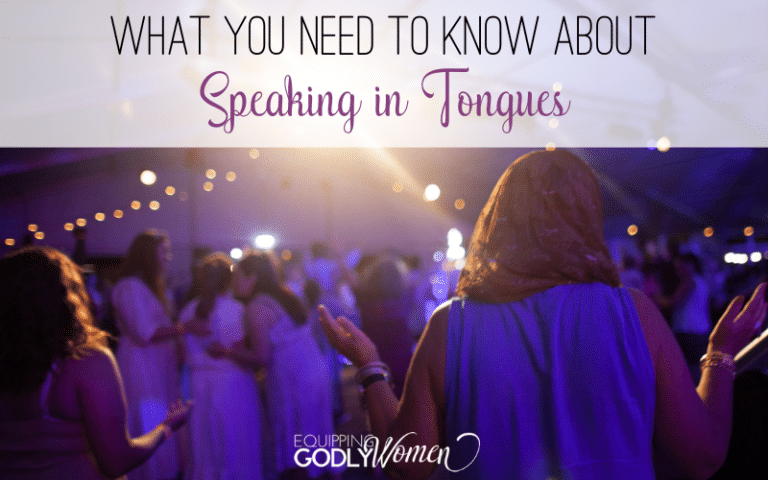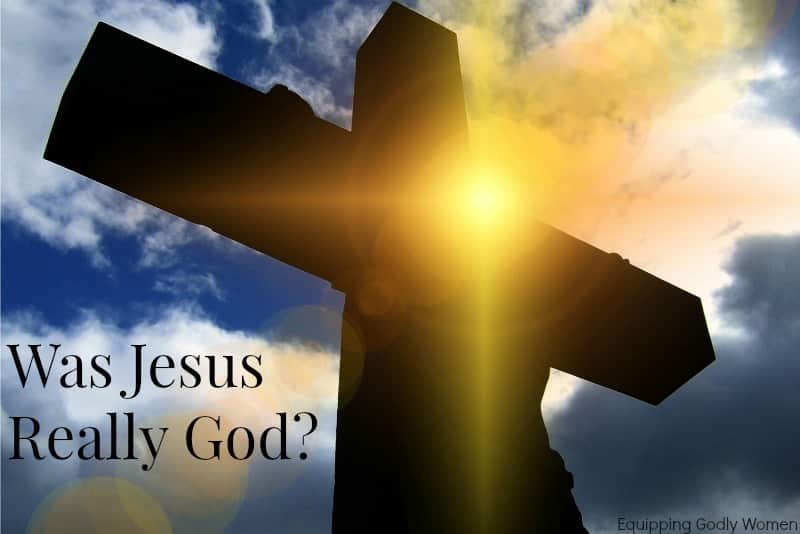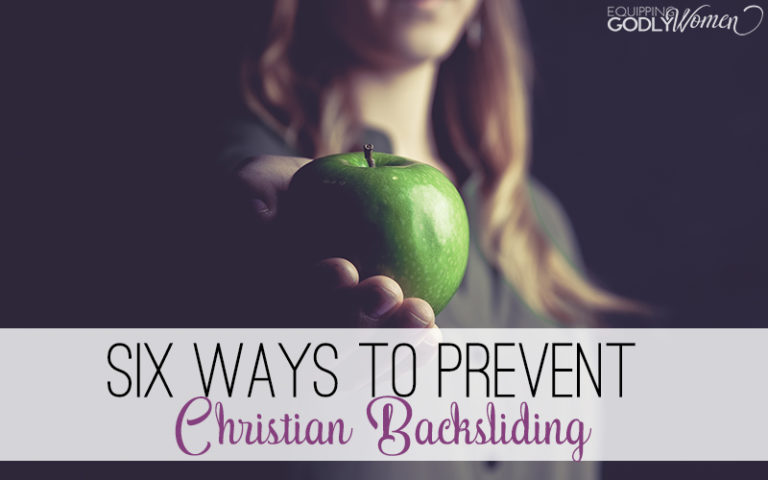Should Christians Drink?
 Should Christians drink?
Should Christians drink?
Not according to the little Baptist Church I grew up in.
A people with a genuine love for the Lord, they also had a genuine love for the “rules” … and making sure that everyone followed them.
Holding hands was seriously frowned upon, and if the girls’ skirts went above their knees at all… well, they were pretty much asking for it.
My own parents weren’t quite so strict, but they didn’t drink either–no one I knew did–so it just wasn’t something I grew up around.
In fact, I spent my 21st birthday at Steak n Shake with a table full of good friends, and I couldn’t have asked for a better birthday.
(You can read more of my faith story here)
Ask my husband about his family’s relationship with alcohol, though, and you’ll get a completely different story.
Should Christians drink alcohol, according to them?
Sure, why not? They’re old enough. They’re responsible.
For his family, alcohol is a normal part of life. It’s not even a thing. It’s just normal.
They serve wine at Christmas dinner. They drink margaritas when they go out with friends. They mix fruity drinks when they head out on the lake. And they bring a case of beer to church league softball to share with the team.
Because, oh yeah, his parents are just as committed of Christians as my parents are. They just have different family traditions.
Should Christians Drink Alcohol?
So, who’s right?
Should Christians drink or abstain from alcohol completely? Is it sinful, completely fine or somewhere in the middle?
It’s a question Christians have (vehemently) debated for years now, and honestly, there are some pretty solid arguments on both sides.
So what does the Bible say?
What Does the Bible Say About Drinking?
A lot, actually. Not only are there several scripture verses in the Bible about the act of drinking itself, but there are also a number of other verses that can easily be applied to drinking.
Read the Bible for verses about drinking, and here’s a brief overview of what you’ll find:
1. The Bible is very clear that drunkenness is a sin.
“Do not get drunk on wine, which leads to debauchery. Instead, be filled with the Spirit” –Ephesians 5:18
“Let us behave decently, as in the daytime, not in carousing and drunkenness, not in sexual immorality and debauchery, not in dissension and jealousy.” –Romans 13:13
“The acts of the flesh are obvious: sexual immorality, impurity and debauchery; idolatry and witchcraft; hatred, discord, jealousy, fits of rage, selfish ambition, dissensions, factions and envy; drunkenness, orgies, and the like. I warn you, as I did before, that those who live like this will not inherit the kingdom of God.” –Galatians 5:19-21
Most Christians don’t debate this. Everyone knows excessive drinking is wrong–even the beer manufacturers themselves–so this isn’t really the point anyone is arguing about.
2. In fact, the Bible goes so far to say that Christians shouldn’t even eat with people who claim to be Christian, but live a drunken lifestyle.
“But now I am writing to you that you must not associate with anyone who claims to be a brother or sister but is sexually immoral or greedy, an idolater or slanderer, a drunkard or swindler. Do not even eat with such people.” –1 Corinthians 5:11
**Please notice one important distinction here–this verse is NOT saying that Christians shouldn’t hang out with anyone who drinks, or even with anyone who gets drunk.
It is saying Christians shouldn’t associate with Christians who claim to be Christians who are “drunkards.” This verse does not include non-believers.
Related Reading: Why Christians Belong in Bars
3. But nowhere in the Bible does it say that drinking in moderation is a sin.
There are plenty of verses about drunkenness. There are verses warning about the addictive and destructive nature of alcohol when taken too far. (Like Proverbs 20:1, 21:17 and Ephesians 5:18)
But there are no verses that say that any and all drinking is wrong, and there are no verses that tell us exactly where the limit should be.
The Bible never explicitly answers the question “Should Christians drink?” Instead, it gives us general examples and principles we can use to come up with good, common-sense guidelines for ourselves.
Any limits, rules or guidelines that give a specific number or amount (including abstaining completely) are rules that have been created by man. Which is absolutely fine and good, but they should not be confused with rules created by God, because they’re not.
4. In fact, Jesus himself probably drank and the disciples did too.
You probably remember the story of Jesus turning water into wine at the wedding at Cana in Galilee in John chapter two (read the whole story here). But what you may not realize is that that isn’t the only time the Bible mentions Jesus and alcohol in the same story. Or that the same goes for his disciples.
Consider these verses for example:
Jesus drinks “from the fruit of the vine”
“I tell you, I will not drink from this fruit of the vine from now on until that day when I drink it new with you in my Father’s kingdom.” –Matthew 26:29
By the way, think Jesus only had grape juice or very mildly alcoholic wine? Not likely.
“Did Jesus Drink Wine” on Biblestudy.org makes some fantastic points:
- “At the time of the Passover the usual Palestine grape harvest had already occurred half a year earlier. Since juice…had no way of being preserved in the first century, Jesus and the apostles HAD to ingest something that was fermented.”
- “Biblical evidence shows a consistent reference, from cover to cover, that wine is an alcoholic beverage able to make a person drunk with its overuse.”
- “Clearly, Noah or Lot did not get intoxicated on unfermented drink”
- “If nothing but juice was used in the early church, then it makes no sense whatsoever why the 120 disciples on Pentecost are accused of drunkenness on a Holy Day (Acts 2:1-4, 7, 13).”
But back to our Bible verses…
The Son of Man came eating and drinking, to the point where people accused him of being a drunkard:
“The Son of Man came eating and drinking, and they say, ‘Here is a glutton and a drunkard, a friend of tax collectors and sinners.’ But wisdom is proved right by her deeds.” –Matthew 11:19
Paul instructs Timothy to drink less water and more wine:
“Stop drinking only water, and use a little wine because of your stomach and your frequent illnesses” –1 Timothy 5:23
5. And there are PLENTY of positive references to alcohol all throughout the Bible
Take these ones, for example:
“Go, eat your food with gladness, and drink your wine with a joyful heart, for God has already approved what you do.” –Ecclesiastes 9:7
“Use the silver to buy whatever you like: cattle, sheep, wine or other fermented drink, or anything you wish. Then you and your household shall eat there in the presence of the Lord your God and rejoice.” –Deuteronomy 14:26
“Let beer be for those who are perishing,
wine for those who are in anguish!
Let them drink and forget their poverty
and remember their misery no more.”–Proverbs 31:6-7
“’The days are coming,’ declares the Lord,
‘when the reaper will be overtaken by the plowman
and the planter by the one treading grapes.
New wine will drip from the mountains
and flow from all the hills,
and I will bring my people Israel back from exile.‘They will rebuild the ruined cities and live in them.
They will plant vineyards and drink their wine;
they will make gardens and eat their fruit.
I will plant Israel in their own land,
never again to be uprooted
from the land I have given them,’
says the Lord your God.”–Amos 9:13-15
6. That’s because the whole “no drinking at all” thing is a relatively recent thing
Should Christians drink? If you would have asked Christians a couple of years ago, they probably wouldn’t have minded.
This is because the “total abstinence” mindset is absolutely a cultural preference that has shifted over time.
From “Why So Many Christians are Relaxing Over Drinks” from Christianity Today:
“Christians have always been concerned about drunkenness, but it wasn’t until the Protestant social reform movement of the 1800s that temperance was equated with complete abstinence.
“It’s an ‘American oddity,’ said Jennifer Woodruff Tait, managing editor of Christian History magazine. ‘It’s not that groups of people throughout history didn’t practice complete abstinence. The Nazarites in the Bible didn’t drink alcohol. But in the 19th century, a whole segment of the church said it’s not just an ascetic practice that some people might choose; they said this is for everybody—all Christians must stop drinking or they’re not Christians.’ “
The view of alcohol has changed over the years. The Daily Press makes some very interesting points:
“Before the temperance movement took hold in the United States in about the mid-1800s, most Protestant religions – even Baptists and Methodists – allowed drinking wine in moderation, according to David L. Holmes, professor of religion at the College of William and Mary.
“But around the middle of the 19th century, the Protestant suspicions of the world and its amusements changed in America,” says Holmes…
“By the later 19th century, these denominations had switched from a stance of temperance to total abstinence.
“On the other hand, members of Roman Catholic, Eastern Orthodox and many Lutheran and Episcopal churches saw no change in their denomination’s acceptance of drinking in moderation.”
Which makes total sense to me as I grew up Baptist and my husband grew up Catholic. We both believe the Bible. We just each follow different customs and traditions when it comes to questions like “Should Christians drink?” and “Should Christians Participate in Halloween?”
7. Should Christians drink? Just because we can doesn’t necessarily mean we should…
So, if drinking isn’t sinful, it’s encouraged in the Bible, and it wasn’t even an issue for hundreds of years after Christianity was founded, why is it such an issue today? Why are so many Christians asking “Should Christians drink?” when only a couple hundred years ago, it really wasn’t a big deal?
Well, the truth is, just because we can do something, doesn’t mean that we should.
You’re probably familiar with this passage in the Bible:
“‘I have the right to do anything,’ you say—but not everything is beneficial. ‘I have the right to do anything’—but not everything is constructive. No one should seek their own good, but the good of others.'” –1 Corinthians 10:23-24 (Read the whole passage here)
As well as this one:
“Do not destroy the work of God for the sake of food. All food is clean,but it is wrong for a person to eat anything that causes someone else to stumble. It is better not to eat meat or drink wine or to do anything else that will cause your brother or sister to fall.” –Romans 14:20-21
The truth is–no one can deny that alcohol is associated with a myriad of negative consequences. From liver disease to drunk driving to poor choices while under the influences to simply wasting your life away, there are a LOT of behaviors you can prevent when you choose to say no to alcohol.
And you have to ask yourself–is it really worth the risk?
Of course, all of us face a different amount of risk. If you have a family history of alcoholism or if you’ve struggled with it in the past, no, you absolutely should not be drinking.
But if you’re someone like me–with no history of alcohol problems and honestly very little desire to drink anyways, the risk really isn’t big enough for me to worry about. Yes, I have my own struggles and temptations, but alcohol simply isn’t one of them. We nearly always have some in the house somewhere, but I don’t even remember the last time I had a drink, because I just truly don’t care.
But what about those around us?
Just because my risk for alcoholism is negligible doesn’t mean the same is true for others. What if my drinking were to cause someone else to stumble?
This is a very valid concern, and one we need to take seriously, but also one we need to be reasonable about.
Yes, it would probably be wise to be extra considerate if you are having lunch with a known alcoholic, new Christian, young child or someone you know who would be easily offended or affected.
But I don’t believe that means you can never, ever drink because *someone* out there somewhere *might* see you drink and suddenly turn into an alcoholic.
The truth is, yes, you have a responsibility to be a good steward of your life and to set a good example, but the choices people make are ultimately their own.
Plus, where do you draw the line?
Personally, my downfall is cookies. (Seriously, folks) Should I expect the world to stop eating deserts because I struggle with self-control in that area? Or should I see that as a trial to overcome, a chance to grow in faith and discipline, and a good chance to remember “I can do all things through Christ who strengthens me” (Philippians 4:13)?
Or what about the fact that I used to be anorexic many, many years ago? Should I insist that all skinny people gain some weight and stop posting pictures of themselves on Instagram because that might be a trigger for me? Or should I use enough common sense to know that with my history, those images probably aren’t the best images for me to fill my mind with?
The same goes with anything people struggle with–whether it is alcohol, cigarettes, porn, overeating, anger, worrying or anything else.
Yes, absolutely be considerate of others. Especially when you know those around you deal with these things. But understand that at the end of the day, people’s choices are their own, regardless of what you do or do not do.
8. And just because you choose not to drink doesn’t make you “more holy”
So now your choice is up to you.
- Will you enjoy a few drinks over a backyard barbecue with friends, knowing that you can all enjoy responsibly? That’s absolutely fine.
- Will you head out to the bar and start up a conversation with a random stranger who looks like he needs to chat in an effort to share the gospel? That’s great. (See: Why Christians belong in Bars)
- Will you abstain completely so as not to make those around you stumble? That’s great too.
Just keep in mind–it isn’t the choice you make that matters so much as the reason you make the choice you do.
- Is alcohol a way to connect with friends and family or a way to escape your problems when you should be turning to God?
- Is abstaining a way to show love and care for others or just another religious checkbox for you to check off so you feel extra holy this week?
That’s a question you’ll have to answer honestly yourself–between you and God.
If you’ve made it this far down, tell me what you think: Should Christians Drink? Why or why not?







I have found the same: my husband, who is Catholic, and his family have no problem with drinking. In my background, I am Methodist, there is this whole big abstinence movement. Imagine my surprise when I went to a PTA meeting at my daughter’s Catholic school and they served wine. Seriously. It’s just not an issue, and I think that because it isn’t an issue, it doesn’t ever become an issue… If that makes sense.
lol. Wow. at a PTA meeting even? That’s crazy. To each their own though, I suppose! 🙂
You are wise beyond your years
I know where your wisdom comes from.
Thanks
Great thoughts, and I appreciate your conclusions! Living and ministering in France, drinking alcohol is a normal part of every meal (except breakfast, of course.) Drinking in moderation is part of the lifestyle here, for most families, Christian and non-Christian alike. Never having been tempted by alcohol, I have no problems not drinking it, and I don’t offer it to our guests. When they talk to me about it, it gives me an opportunity to share my reasons for not drinking: my children, my health, etc, but I am always clear in saying that I DO NOT believe that drinking is a sin. To do so would be VERY difficult to the people I am trying to witness to. Having said that, I think that Christian families who drink alcohol need to be very clear with their children and the example they set, knowing that children imitate (often to the extreme) our own lifestyle choices. Thanks for sharing on this difficult subject! Hugs from France
You know, I always think of France when I think of how normal drinking can be! Great to hear from someone who actually lives there.
About setting an example for our children–my husband had a really great perspective on this–he said that drinking (moderately) in front of children IS setting a good example. It’s showing them that it doesn’t have to be a go to a bar and get super drunk kind of thing. This is how you enjoy a little, and know when to call it quits. I thought that made a lot of sense.
Regularly moderate drinking is just bad as bingeing which is exactly what they have in countries like France, Spain and Portugal, if people in the UK made it part of their everyday life, like they do in those countries, it would cost the NHS. http://www.newagora.ca/surprising-effects-of-moderate-alcohol-consumption-by-anna-hunt/ which is BBC documentary which follows a study they conducted on twins one which binged the other stuck to the government limit of three units a day and results that came back at the end of the month. Please make an effort to watch it then back to me and tell me what you think.
I have a glass or two of wine maybe once a month; and when we go out to eat, I may have a Margarita or Daiquiri, but that’s it. I’m not a big drinker, but because of that I have to be careful because it doesn’t take much alcohol to begin to get a buzz going…that’s definitely when I’m done…and that can be as little as a single glass of wine drank a little too fast. But, as I said, I don’t drink very often, and certainly don’t do it with the intent to get drunk. I believe this is fine, it’s when we take it too far, that it’s a problem. Just my opinion.
I’m the same way. I haven’t really drank in a couple of years now between being pregnant and nursing, and it hasn’t been anything at all to give it up. But I imagine I will again someday when the babies aren’t so little. Not a huge deal 🙂
I do not drink. I gave my life to the Lord 5 years ago. I am 45 now and have struggled with alcoholism most of my life, but was only drinking moderately when I was saved. I was determined that the Bible did not say it was wrong to drink. I researched for myself and felt that for the most part no good thing came from people in the Bible who drank. Then got honest with myself and decided that I truly drank to get at least a little drunk. I enjoyed this article and agree that while it is wrong for me, it’s not necessarily wrong for everyone. Thanks for your article!!
Yes! Your motives make a huge difference! And if it’s going to be a stumbling block, then by all means, stay away! That’s great that you recognized that for yourself. We ALL have something we deal with–it’s just different for everyone.
Great post! I love the depth of knowledge provided on this topic. My wife grew up in the church of Christ and the rules in that denomination run deep. I however grew up mostly baptist and while I did not have as many rules growing up from my parents because of our religion, there were some that I thought just did not make sense. For example my parents would not let me have friends. A lot of the issues with rules that I have is that when you start with onerule that is not from God, you never know where to stop and can actually become useless for God on earth. Like you I do not drink but that is because I don’t care for it. But I don’t not impose that rule on myself because the gospel is the good news of what God has to offer. Not the bad news of what we can’t have.
Crazy how much our backgrounds influence what we believe, huh?
My husband and I drink in moderation. We are Orthodox Christians, and wine is seen as a part of feasting. Whenever the Church celebrates a major feast (Easter, Christmas, Pentecost, etc.) wine is part of the celebration. However, it is also important to note that for Orthodox Christians, wine is also not allowed during fasting periods. We fast for about one-third of the year, so that means that we abstain from alcohol (and meat and dairy) for a good portion of the year. During that time we focus on the spiritual disciplines. Then, when the end of the fast comes, which always ends with a feast, the wine is part of the celebration. It adds to the joy. I hope that makes sense!
Interesting! I didn’t know you all fasted that much!
I am a Christian and a prohibitionist — that would include all recreational drugs.
Paul gave Timothy medicinal instructions since the water in those days was unsafe to drink. It was not an affirmation of recreational drinking. Certainly, if you have an ulcer or a hole in your stomach that would not be good advice.
That all things are lawful, but not all things are profitable would certainly apply to any type of drug abuse including alcohol. An honest person would have to ask, “Why do I drink?”
My experience has been, after 60+ years, that people drink for the drug effect — for the buzz, if you will. In my town, that is legally considered intoxication, and if you get caught driving in that condition, well, it could be very costly.
It seems to me that any measure of impairment would be a sin. To take a little wine, as Paul advised, might be one or two ounces in a glass of water — certainly not enough to get a buzz.
Mostly, I’m a prohibitionist because of my first-hand witness of the many lives that have been destroyed by alcohol. It is one of the factors that led me to recently quit my job. For the past 11 years I worked in a retail convenience store. I had up to 500 customers a day, and most of these were beer sales. For me, as a Christian, I was tormented to see the lives of so many people ruined by alcohol. I’ll share one example.
Aabid was a member of the local Chaldean assembly. His family escaped Iraq during the brutal reign of Saddam Hussein. Aabid drove a taxi to support his family. One night he stopped at the store to fuel up and buy a cup of coffee. As he drove away his taxi was broadsided by an SUV that ran a stop sign at 55 mph. The sound of the collision roared through the quiet residential neighborhood. The driver of the SUV (who had prior convictions for drunk driving) fled the scene.
Aabid died instantly. His family arrived and held a vigil all night long in prayer and mourning.
How many lives have been destroyed because of alcohol (and drugs)? How many jobs have been lost? How many families have been torn apart?
This isn’t about what is lawful or permissive. One person’s right ends when it violates the rights of another. That prohibition might save the life of even one person, or spare one family the anguish and grief of losing a loved one — it seems to me that sobriety is the greater virtue.
That’s very sad 🙁
The only problem with that argument, in my opinion, is – where do we draw the line? Cars kill people – should we not drive them? Knives kill people – should we not eat sandwiches? Yes, of course that would be ridiculous. It’s just such a murky area with no clear answers.
I’m glad you’ve been able to make and firmly keep a decision you feel comfortable with 🙂
I do not drink. Because I had an alcoholic father and brother….so no as a Christian I choose not too drink at all.
That is an absolutely fantastic reason. I don’t blame you one bit.
First, thank you for providing such a thought provoking article. Second, I am an adult child of an alcoholic and I have continually sought similar relationships because I didn’t realize it wasn’t “normal” to love a true alcoholic. In fact, I occasionally drank myself and would drink with the alcoholics in my life hoping they would stop when I did. God shook up my world almost 2 years ago and I don’t drink at all now. Some of this is the heart change the Holy Spirit made, but mostly out of respect for my husband who is 18 months sober. Finally, I agree it is not a sin to partake of wine, but it is a sin to abuse it (like any form of glutany). As a result of my heart change, I now help others like me at my blog Transforming Normal (www.kimberlydewberry.com). For years I didn’t realize I had issues with addicts in my life. I had become blind. God lifted the veil and helped me see. My mission is to help others do the same. God bless and thank again for this wonderful article!
I’m so glad God was able to take such a negative in your life and turn it into such a positive! (Love it when He does things like that!)
And yeah, we ALL have things that we grow up with and never realize how abnormal they are — you’re definitely not alone in that! 🙂